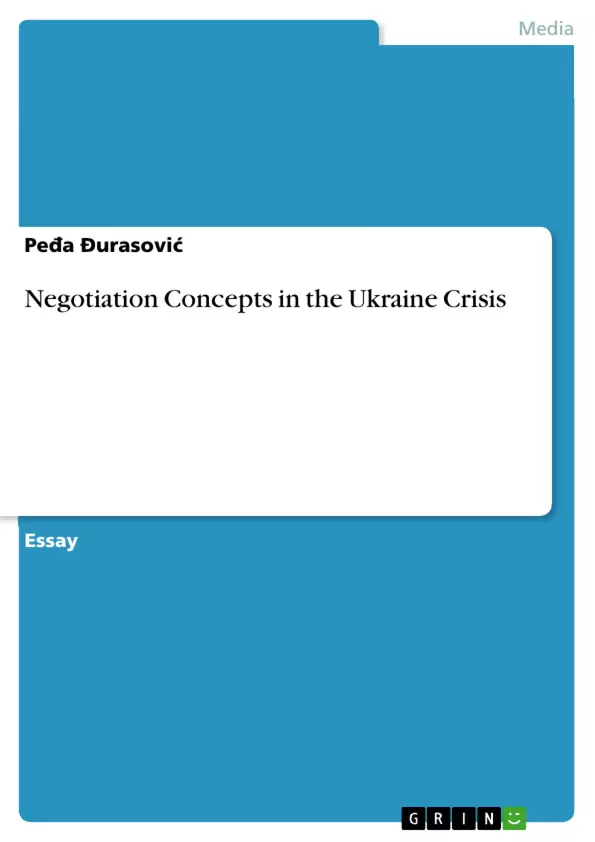This paper presents my intention of providing you with an overlook of the knowledge that I have gained during the course of subject titled Communication and Negotiation skills. Through commenting on negotiation over Ukraine Crisis which I found as a most suitable model for the course knowledge application, you will get an insight into my understanding of the practical application of concepts acquired through this course. In addition, you will find the interpretation of the negotiation and communication concepts through my personal application and self-evaluation.
Inhaltsverzeichnis (Table of Contents)
- The Negotiation over the Ukraine Crisis as a Model for the Knowledge Application
- The Introductory Information on the Ukraine Crisis
- The Distributive Aspect of the Peace Negotiation in Minsk
- The Failure of a Multiparty Integrative Initiative in the Peace Negotiation in Minsk
- The lack of Ukraine's well developed BATNA
- Application of Communication and Negotiation Concepts in Real Life
- Theoretical and Practical Reflection on My Negotiation Mindset
Zielsetzung und Themenschwerpunkte (Objectives and Key Themes)
This paper aims to reflect upon the knowledge gained in the Communication and Negotiation Skills course by analyzing the negotiation process surrounding the Ukraine crisis. It provides an overview of the crisis, examines the negotiation efforts, and explores the applicability of key course concepts. The paper also incorporates a personal reflection on the author's negotiation mindset.
- The application of communication and negotiation concepts in the context of the Ukraine crisis
- Analysis of the distributive and integrative negotiation approaches employed
- Evaluation of the strengths and weaknesses of the negotiating parties' positions
- The importance of understanding BATNA (Best Alternative to a Negotiated Agreement) in international conflicts
- Personal reflection on negotiation skills and mindset
Zusammenfassung der Kapitel (Chapter Summaries)
This section provides a summary of the key chapters in the paper.
- Chapter 1: The Negotiation over the Ukraine Crisis as a Model for the Knowledge Application: This chapter introduces the Ukraine crisis as a case study for applying negotiation skills. It explores the genesis of the crisis, highlighting the complexities and multiparty negotiations involved.
- Chapter 1.1: The Introductory Information on the Ukraine Crisis: This section provides a brief overview of the events leading to the Ukraine crisis, beginning with President Yanukovych's decision to suspend the trade agreement with the European Union.
- Chapter 1.2: The Distributive Aspect of the Peace Negotiation in Minsk: This chapter analyzes the first attempt at establishing peace in eastern Ukraine, focusing on the Memorandum of Minsk signed in 2014. It highlights the distributive nature of the negotiations, emphasizing Russia's dominant position due to its military influence.
- Chapter 1.3: The Failure of a Multiparty Integrative Initiative in the Peace Negotiation in Minsk: This chapter further examines the Minsk negotiations, exploring the failure of integrative approaches in achieving a sustainable peace. It discusses the challenges posed by the non-negotiable positions of the involved parties.
- Chapter 1.4: The lack of Ukraine's well developed BATNA: This chapter focuses on Ukraine's lack of a well-developed BATNA (Best Alternative to a Negotiated Agreement), which hindered its negotiating position and contributed to the stalemate.
Schlüsselwörter (Keywords)
The primary focus of this paper lies on communication and negotiation skills applied to the Ukraine crisis. Key concepts explored include distributive and integrative negotiations, negotiation dynamics, BATNA (Best Alternative to a Negotiated Agreement), and the influence of international power structures on negotiations.
- Citation du texte
- Peđa Đurasović (Auteur), 2017, Negotiation Concepts in the Ukraine Crisis, Munich, GRIN Verlag, https://www.grin.com/document/505439



